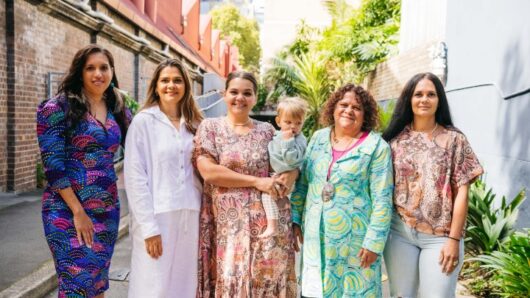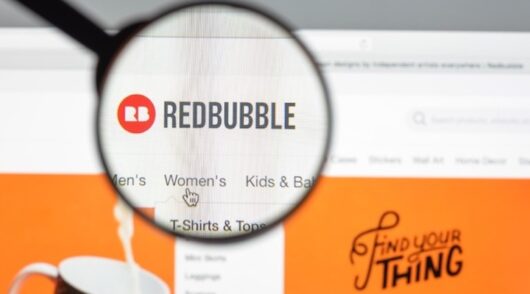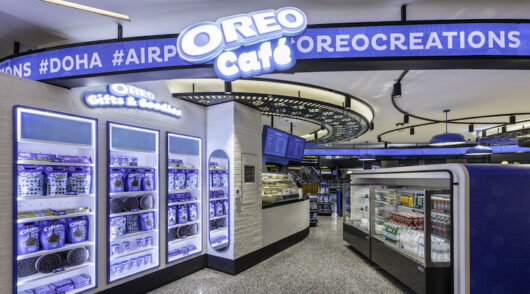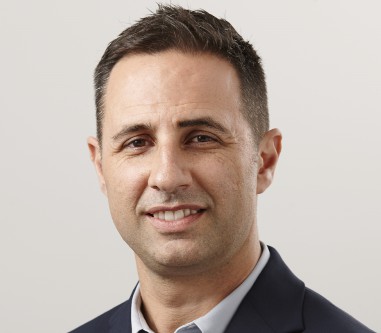 BIO: Luke Longo leads a team of third generation family members and over 200 employees in the Aquila business, a national retailer that delivers high quality men’s footwear, clothing and accessories across over 50 Australian retail stores, Myer department stores and online.
BIO: Luke Longo leads a team of third generation family members and over 200 employees in the Aquila business, a national retailer that delivers high quality men’s footwear, clothing and accessories across over 50 Australian retail stores, Myer department stores and online.
COMPANY PROFILE: Since its inception in 1958, Aquila has built a solid reputation for quality men’s footwear using European styling and traditional construction techniques. In 2012, Aquila added men’s clothing to its product range with quality materials and craftsmanship remaining at the core of its product offering.
Inside Retail Weekly: How have things been for the business over the last 12 months?
Luke Longo: It has been a busy twelve months for Aquila as we continue to grow the business. Certainly, retail has thrown up a few challenges for Aquila and I would say for many other retailers in the footwear and apparel fashion space. With obviously changing consumer buying habits, bricks and mortar retailers are really fighting a bit of an uphill battle against declining footfall. We know that for a fact. They’re challenges that have presented themselves, but I think that as far as Aquila has gone, we have a sound business and been able to push through reasonably well.
Online is probably the real shining light for our business – and this is probably reflective of the broader market and retail community – in that online traffic and sales continue to comp at very, very high levels year-on-year, as you’d probably expect given the changes in the way that people are shopping now.
Mobile and other devices have brought about a big change in the way customers are wanting to transact now. Online for us has been very strong.
IRW: How would you describe Aquila’s digital strategy – how does the company approach it and what channels are being targeted for growth?
LL: Because digital is one area of the business that continues to grow strongly, we are investing more capital into that channel. We are looking at re-platforming our website, which is a priority for us.
We’re looking at other initiatives – for example ship from store has been very good for the business and helped us increase our online sales quite dramatically. We deal with third party marketplaces and have a very strong relationship with Myer and The Iconic – those types of vendors have been very good for us as well.
But I think as a business, what we’re very focused on because we do play in that more premium space as far as product goes, is that overall customer service and experience perspective, to make sure that whatever happens online is reflective of what happens in-store and vice versa.
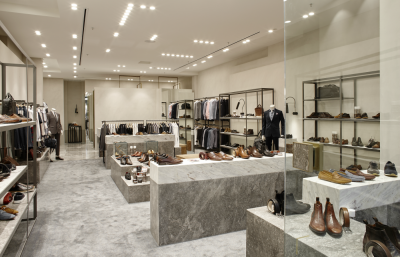 IRW: When it comes to footwear and how customers approach the aspect of sizing, how confident are they shopping online?
IRW: When it comes to footwear and how customers approach the aspect of sizing, how confident are they shopping online?
LL: Customers are pretty savvy the way they shop online now. When you’re a recognised brand and have a very loyal customer base – I think once a customer knows that he is a size 42 in his Aquila shoes – he’s pretty confident in purchasing on that basis.
Customers now just accept the fact that there’s always going to be an element of risk in online shopping, but the fact that we offer free returns, free shipping – as do many other online retailers – the risk factor of getting the wrong size isn’t there as much.
Consumers are now accustomed to the fact that it’s no big deal and probably a lot less inconvenient to buy online, try it on at home and return if it doesn’t fit rather than having to get into a car, drive into a shopping centre and do it that way. So I think it’s probably the lesser of two evils, even though there is a risk of not getting the right size.
We also have a very strong network of stores too and offer customers who don’t want to return incorrect items via our online channel, the option to take items in-store to return or exchange it for something on the shopfloor.
IRW: What do you think the importance of brand heritage in today’s competitive marketplace is?
LL: For anyone, brand heritage is extremely important in today’s day and age. As business gets a hell of a lot more competitive and the retail market has become very competitive of late – I think it’s what sets you apart from your competitors.
If I look at our heritage, it extends back to my grandfather Tony, who was a skilled cobbler back in Italy. When he started this business, he applied his skill and made great fashionable footwear and today those basic fundamentals of the brand are still true.
So we still do make fantastic quality product that our customers have come to love and trust us for. So in passing on his skills to his children and now on to us as a third generation, we continue to produce beautifully crafted footwear in the same way he did.
That is true heritage and it can’t be bought or made up and it’s what sets you apart from competitors. We have 60 years of heritage this year, we’re turning 60 years old as a business – you can’t buy that.
IRW: What’s it like growing up as part of a family oriented business?
LL: Growing up in a family business – we always talked men’s shoes and Aquila even at family functions, so we all had a common interest among my immediate family. Having that common thread was always interesting. We grew up in and around our factory in North Fitzroy and lived, breathed Aquila and men’s shoes – we still do to be honest.
It was great to get involved at that level – going to work on school holidays with my father who would give odd jobs to do around the factory like sweeping the floor, lacing up shoes or boxing shoes.
We had great fun and I remember being there with my brother David, cousin Anthony who are still involved in the business today. Those learnings you get – seeing how shoes were made and how a factory operated – to running a business today have been invaluable.
Once I started in the business and was taken under my father’s wing – he taught me a lot about business, some of the things that you don’t necessarily learn at school or university.
IRW: How would you describe the ways that retail’s changed during your time in the industry?
LL: The digital age has obviously been the catalyst for most of the changes. When you think about how we transact and reach customer’s today through the use of digital – when I first started working on the shopfloor, there was no internet, emails, social media, no ship from store offer or click and collect. Basically you had a storefront, great staff and great product.
Those elements still exist today and are very strong and no less important – but having the world of digital at your fingertips now, you can transact anywhere, you can buy product on your mobile phone, research product on your mobile phone. It’s become a lot easier to connect with customers and for customers to connect with you.
From a digital perspective, it’s given us a hell of a lot more rich data that we can utilise to improve the business, which is something that we never had 10-15 years ago. Basically we didn’t have any of that rich data and relied on that gut instinct. But now you can track everything through the digital landscape.
IRW: Has that evolution extended to perhaps Aquila’s approach to merchandising and perhaps the speed of designs to market?
LL: It certainly forces us to be a lot quicker to market – because now consumers can research product from anywhere in the world. We are no longer what we used to call a season behind – our seasons are in line with what’s happening in the northern hemisphere as well.
We need to be and are very conscious of the fact that whatever the brands overseas are bringing out, we need to compete and bring out that same type of product and styling at the same time.
We can’t be seen to be late with designs or products – we need to be on time and compete with them in getting product from design to shop floor. Ultimately if we don’t have it, consumers will transact and buy from overseas brands and competitors.
Because of the internet now, you can do that. You can buy things from Facebook and Instagram or by accessing another website on the other side of the world. If that’s where the product that you want is, you can get it. Never used to be like that.
IRW:You mention competitors – how have international entrants and new channels impacted on the business?
LL: Once upon a time, your main competition would come from the shop next door or in the shopping centre but now – and as a consumer myself – I can buy from any brand or company I’d like to from around the world. So it’s not just isolated to the domestic market. You’ve got companies like Mr Porter, ourselves and those big brands delivering to Australia and so as long as they can deliver to Australia, I can buy it.
Internet shopping has made the world a lot smaller from a consumer perspective – which is a good thing. It keeps us local retailers on our toes.
Also, as a lot of people travel now – domestically and overseas for holidays or work – international travel is a lot more prevalent than what it used to be and a lot of people do their shopping in New York, LA, London, Milan or wherever they are. We also compete at that level too.
IRW: What are expansion plans for the company?
LL: We are working on a couple of key initiatives. Without giving too much away, we are looking at potentially opening up within international markets. As much as international players are entering our domestic market, we also need to play in their backyards as well so we are looking at ways to break in to the US, Asia, European markets with our product.
We think that we have a good, strong value proposition that we can offer. The other thing is we are trying to leverage the brand a little bit more by way of diffusion brands – looking to expand into other markets in Australia by way of an Aquila diffusion brand too that will help us tap into another market.
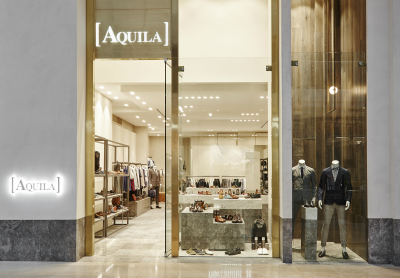 IRW: You mentioned that Australians are a season behind and flipping that around – can local retailers also lead the way?
IRW: You mentioned that Australians are a season behind and flipping that around – can local retailers also lead the way?
LL: We have a lot to offer the rest of the world – I think Australia is perceived from the rest of the world as something unique, relatively untouched.
It’s possible for us to compete a lot more and sometimes we sell ourselves short a little bit. I think we have great product, designers and retailers in this country – and certainly I think we can push into overseas markets. We can offer something unique and I think in a world of retail and globalisation, which sometimes can be a little bit vanilla with same brands on every street corner and every single shopping centre, the fact that Australia has been relatively small in that space for a while – we can offer something different to international markets.
IRW: It’s refreshing to hear that – not always having to go overseas for inspiration…
LL: Absolutely – we do have the unique proposition that we are relatively young in age.
We do have a unique retail market and brands, and I think the world probably craves a little bit of uniqueness at the moment because the big retailers are very prevalent in most of the major shopping strips and centres around the world. Customers to a degree are wanting to experience and see something that’s a little bit different. That’s where we can play our part because we do have a different perspective on things.
IRW: What are some highlights for the business in recent times?
LL: Back in 1958 my grandfather founded the business so I’m immensely proud to be celebrating 60 years of business in Australia. It’s amazing for me to think how this business started back in the 1950s, in a small factory making men’s shoes and how it’s transformed now into a national retailer with nearly 60 stores having expanded into various channels and product lines.
We are not just men’s shoes now, we have a strong menswear and accessories division as well. We have everything from our stand alone bricks and mortars in centres like Chadstone and have a very good relationship with Myer through concession stores that have been excellent for the business, plus a strong outlet program too.
Sixty years down the track is a long time to be in business and I can’t say how proud I am of our family, to see my grandfather back then in the early days making shoes through to today, is a credit to the family.
There’s not a lot of retailers out there that are 60 years old – there’s been a lot of new players over the last 10, 15 years – I’m pretty proud that we’ve stood the test of time.
IRW: Tell us a little bit about the Myer concessions and what brought that about?
LL: About five years ago we opened up the first couple of concession stores with Myer and they proved to be really strong sales in those two stores – we opened in the Melbourne and Sydney CBD – and since then we’ve opened up quite a number of them and that’s across all states too.
What that’s been able to do is allow Aquila to attract a new customer – and allows Myer to have the Aquila brand – so it’s the best of both worlds for both parties. Not that I can speak for Myer but it’s been a really good relationship for Aquila being associated with Myer who are great partners. And it’s been very successful.
When we were looking to expand the business and tested those first two stores – it gave us an avenue of getting in front of new customers that perhaps had never shopped with Aquila in our stand alone stores.
Myer does have a very strong loyal customer base and so for us having a concession stores, shop-in-shops in their footwear departments gave us the opportunity to put our brand, put our product in front of a new customer.


